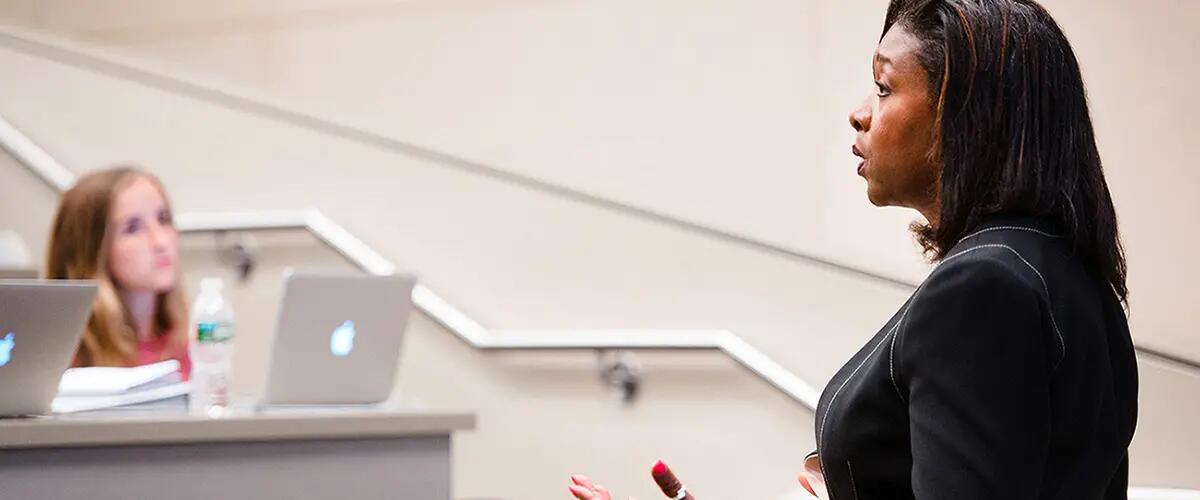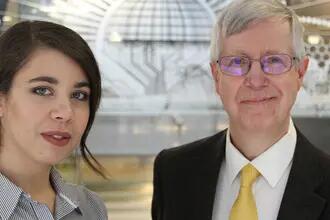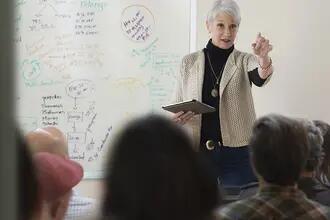
Accounting professor Helen Brown-Liburd wants to have an impact on her students.
Bringing professors of color into the classroom
Professor Jeffrey Robinson worked as a project engineer for Merck before he decided to change the course of his career and become a business school professor.
"I always felt there was something more I was capable of doing – intellectually and professionally," Robinson said. "I wanted to have more influence on things going on around me. I wanted to have more impact."
In 1997, after his father pointed out an advertisement for an organization called the PhD Project, Robinson arranged to attend the organization’s next annual conference. He decided he had found the “something more” he wanted: And he soon left Merck to pursue a doctoral degree.
Now, he teaches undergraduates and MBA students about entrepreneurship and social entrepreneurship at Rutgers Business School. In addition to producing research, he serves as academic co-founder of Rutgers Business School’s Center for Urban Entrepreneurship and Economic Development. The center is a major force in training and supporting business owners in the Newark area.
"This is exactly where I wanted to be," Robinson said recently.
While the PhD Project has helped to attract professionals of color into doctoral programs and into academia, Rutgers Business School’s long-standing partnership with the organization has helped to form a faculty that is considered one of the most diverse in the nation, outside of the historically black universities.
According to the PhD Project, Rutgers Business School has eight professors who are African-American, Hispanic-American or Native American and are part of the organization’s network. In a recent survey, the organization also counted two professors at the School of Management and Labor Relations (New Brunswick) and two professors at the School of Public Affairs and Administration (Newark) as part of the diversity at Rutgers.
"The PhD Project has delivered many outstanding professors and impressive PhD students to RBS," said Rutgers Business School Dean Lei Lei. "The partnership is a major part of our continued effort to ensure that our world reknowned faculty offers different experiences and perspectives to industry through its research and to students through its instruction.”

Recruiting and mentoring efforts by department chairs add to Rutgers Business School’s diverse faculty so do hiring incentives. In addition to full professors, there are female professors and a half a dozen African-American or Hispanic-American instructors, or professors of professional practice, who add to that diversity.
But by all accounts, its work with the PhD Project is a major reason for the racial and ethnic diversity of Rutgers Business School’s faculty.
Bernie Milano, who was responsible for recruiting at KPMG more than 20 years ago, said the PhD Project was started out of a frustration of not being able to find students of color in business schools. The lack of diversity among business school students was attributed to the lack of diversity among faculties.
The PhD Project changed that by offering African-American, Latino and Native American professionals a path into academia by earning a doctoral degree and going on to teach business. The program recruits them, provides a support system and a professional network.
After 23 years, the PhD Project is large, influential and making a difference at schools like Rutgers and DePaul University’s Kellstadt Graduate School of Business in Chicago. It now counts deans and other business school administrators as part of its network.
Jerome Williams, a marketing professor who now serves as Rutgers University-Newark provost and executive vice chancellor, remembers a time when he was often the only African-American student and then the lone professor of color. It wasn’t just an issue of race and ethnicity, he said. If there were women on the faculty in his early days as a professor, it was usually just one.
Early efforts to encourage diversity produced few results. Then KPMG introduced a different approach with the PhD Project. "From the very beginning," Williams said, "it was one of those instant successes."
The PhD Project took a systematic approach to finding talented professionals and de-mystifying the Ph.D. by providing solid information about expectations, training sessions and a support system of mentors.
One of the earliest mentors working on behalf of the PhD Project was dt ogilvie, a former Rutgers Business School professor who now teaches at Saunders College of Business in Rochester, N.Y.
"I did not have anyone to go to. There was no one to say, this is how to navigate," ogilvie said. "We were out there by ourselves."
She met many prospective doctoral students, like Robinson, during years of PhD Project annual meetings. Those meetings are designed to introduce prospects to schools, explain the requirements of doctoral programs and connect them to people like ogilvie. The support system is strong and the candidates who enter the PhD Program have a 90 percent completion rate.
Professor ogilvie was also a critical part of creating Rutgers Business School’s diversity because she was effective at identifying and recruiting from the PhD Project network. Those who followed her to Rutgers – or came to Rutgers because she was on the faculty – include Williams, Robinson, Brett Gilbert and Geri Henderson, who has since gone to Loyola University’s Quinlan School of Business. Williams was offered an endowed professorship, the Prudential Chair in Business, by Rutgers.
As Williams put it: "Talent attracts talent."
At Rutgers Business School, ogilvie said the PhD Project had the support of deans and department chairs, including Nancy DiTomaso. "We had people who cared and thought it was important and made it happen," she said.
When she was working on her Ph.D., ogilvie said only a handful of people of color had doctoral degrees and less than one percent were in business schools. Professors who came from China and India usually accounted for faculty diversity, she said.
The effort to create diversity at Rutgers has created an atmosphere that attracts more diversity, according to Williams. A diverse faculty attracts a diverse student body and a diverse student body helps create diverse businesses – "the wheel of diversity,” as he described it.
Like Robinson, Helen Brown-Liburd had done well professionally before deciding to make a switch to teaching college business. Her career included 8 years in public accounting and a 9-year stint at Bristol-Myers Squibb in internal auditing. "I was at that point where I was considering doing something different," she said, "but I had no idea what that something else would be."
As a member of the National Association of Black Accountants, Brown-Liburd regularly received information from the PhD Project. When she finally decided to go to the annual conference, there was no turning back. "They do such a great job of answering questions and providing information," she said. "You have enough information to make a decision."
The idea of the PhD Project was that if a school could diversify its faculty – those teaching at the front of the classroom – then it would attract diversity within its student body.
Brown-Liburd, who is an accounting professor at Rutgers Business School, has influenced the accounting field through her research, but she is also someone many students seek out as a role model and adviser.
Stephanie Mason, an accounting professor at DePaul, sought the advice of Robinson before she came to Rutgers. When she started in the Ph.D. program at Rutgers, Brown-Liburd became her mentor.
Mason had spent 12 years at J.P. Morgan Chase before she decided to pursue a doctoral and teach. She said Brown-Liburd helped her to learn humility, helped her to prioritize. The two women became – and remain – research partners. "She’s like a big sister who I’ve looked to for advice along the whole journey," Mason said.
Mason said schools like Rutgers and DePaul embody the goals that drive the PhD Project’s work. "They encourage people to flourish academically, and they can because they can just be who they are."
That's been the experience for Aziza Jones, a current Ph.D. student at Rutgers. When she was an undergraduate attending business school for marketing in Wisconsin, Jones said she was often the only black student in her classes. There were not many professors of color either, she said.
She learned about the PhD Project from a former professor about two years after college graduation when she was looking to move on from a marketing job with a small company."I was really fortunate," she said. "Some people don’t find out about it."

Jones said the diversity that is part of Rutgers makes her feel part of a "protected environment" where she can focus and be more confident. "I don’t have to worry about how I’m presenting myself as a black person only how I’m presenting myself as a scholar," she said. "It took a weight off my shoulders and I can focus on being an academic." The Ph.D. program at Rutgers Business School is also considered one of the most diverse in the nation.
All students benefit when a faculty is diverse, ogilvie said. One of her students, who was originally from Australia, told her she changed his perception of African-American women. "We do have an impact beyond just minority students," she said.
For many professors like Robinson and Brown, the PhD Project represents more than just a path to a new career. It gave them a chance to make a difference and bring a different perspective to industry research and the classroom.
Brown grew up amid the diversity of New York City. She graduated from Baruch College where she had just one professor of color. "There was not one professor who had an impact on my career," she said. "I don’t think that should be the college experience. I want to be that to my students."
Robinson echoes that desire. "There are few places in the experience of people growing up where we can make some impact on young people," he said. "The university classroom is one of them."
"What we talk about, the speakers I bring in, and the cases I use are going to be different based on my experience," he said. "The diversity helps everybody in the classroom."
-Susan Todd
Press: For all media inquiries see our Media Kit


